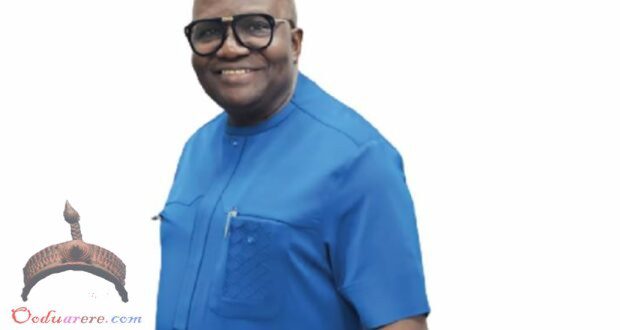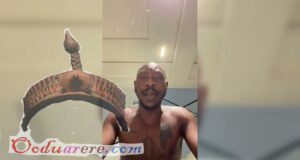By Abiodun Nejo
Retired Assistant Comptroller-General of Customs, Kayode Olusemire, tells ABIODUN NEJO about his childhood and career
You were born and brought up in Ikoro Ekiti, in the Ijero Local Government Area of Ekiti State. What was growing up like?
The journey was not sweet because of the peculiar environment in Ekiti then. One can imagine a son of uneducated peasant farmers in those days. I am sure many of my contemporaries in the 1950s and 1960s experienced similar upbringing. I grew up in a polygamous family setting – two wives and nine children. I am the second child. I had my primary school education at Apostolic Church Primary School, Ikoro. I later attended a secondary modern school before I left for Doherty Memorial Grammar School, Ijero Ekiti. After secondary school education, I went to Lagos where I worked briefly at the Lagos State Ministry of Environment, Planning and Land Matters as a land inspector. We were the ones that acquired pieces of land in areas like Dada Yeye, Isoto, Agbenaje, Meiran, and other places for the government. We were also involved in the acquisition of Magodo 1 and 2. Our team started the road from Victoria Island to Epe in 1981, during the time of Governor Lateef Jakande before I gained admission to the University of Ife (now Obafemi Awolowo University), Ile Ife, in 1982, where I studied Demography and Statistics. I left Ife in 1986 to participate in the National Youth Service Corps scheme.
My parents inspired me equally. They were very close. They even died 16 days apart, so, I would not have known who influenced or inspired me more because whatever my mother told me was what my dad must have told me. There was no secret between them. All I can say is that I noticed that I took after them. They were kind people, full of humility and they respected others. They had what is called courtesy without loss of dignity.
Did it take long before you got your first job?
By God’s grace, I was so lucky after my service year that I didn’t wait or ruminate on where to work before God placed three good opportunities on my laps. It was very rare in the sense that some people after the service year might wait for months or even search for a job for two, three, or four years. But by the Lord’s doing, I got three offers the week I completed my service year. First, I got a job as an Immigration officer before I opted for Customs. I also got a job with the State Security Service (now the Department of State Services. That was how the journey of my career began.
An average person brought up in Ekiti in those days would not have known of these things unless the parents were educated. At that time, our interest was to go to school and at least have a degree. Nobody could differentiate between being an Immigration officer or a Customs officer or any type of job, unlike now that, from secondary school, young ones are guided through some subjects or topics on what they want to become. But what we did then were just subjects like Physics, Chemistry, Biology, Economics, Geography, and Agriculture. So, I never had the plan to become a Customs officer or anything. It was by God’s grace. Someone just saw me and said he had a slot for an Immigration officer. When I was to collect my tag as an Immigration officer, a man there asked me if I would prefer to be a Customs officer. I told him to just give me any one. It was surprising that I was offered two jobs barely seven days after my service year. That was how I joined the NCS, not that I had a plan to become a Customs officer. At that time, teaching was in vogue and an average person would have been a teacher in a village.
You worked for three decades or thereabouts. What would you say prepared you for a successful career there?
Preparation for the future, at times, is based on determination. You have to be determined. You need goals to assist you, you need to be assiduous and dogged. If you are not determined in life, you can’t go far. Importantly, you need God. There is also what is called cognitive exercise where you have to read and apply yourself, at least, to be acquainted with what’s happening in society. The truth is that if you are focused, when you keep on pressing, you will become part of what is happening and you become a cynosure for others. So, part of what helped me was that grace and ability to learn from people. Also, the doctrine we were brought up with in the village those days about respecting one’s elders, facing one’s studies, and not looking down on anybody worked like magic. All these things prepared one. I feel that they may be part of the factors that led me to the level I attained.
How will you rate the NCS as it is today?
The NCS is an evolving organisation. You can see the way it’s moving. In those days when we started the job, it wasn’t like that. At that time, we used to have the single goods declaration. To do SGDs, we used to have papers but suddenly, with the advent of technology, you can see how far the service has gone now. The NCS is evolving every day and things are moving faster than imagined. Recently, the government signed the e-Customs Modernisation Project. We can see how we have gone; from 1996, we moved to 2006 with innovations. From there, the service moved to the automated system for Customs data, which is a computerised Customs management system that covers most foreign trade procedures. The Customs today has moved from all those analogue things. New things are coming up, new ideas are coming. Today, we have non-invasive scanners. In fact, the NCS has gone far, and by the time all these things are deployed everywhere in the country, you discover that it will be difficult for anybody to bring any item that can be used for nefarious activities into the country.
Did any of your children join the Customs like their father?
No, my children don’t have an interest in any of the paramilitary agencies. My daughter is an environmental scientist. Her sibling does not really have an interest in those things. They all want to be on their own and I don’t see the need to teleguide them. The most important thing to me is to give them sound educational foundation and moral upbringing.
It is said that there has always been a desire among the youth to migrate to Europe. Why were you not influenced by this as a young Nigerian?
At that time, Nigerian universities were among the best in the world. When I was at the University of Ife, we had foreign students from America, South Africa, Ghana, and other places. Those who were rushing out of the country then, I believe, were mostly people who did not pass English and Mathematics. That is my perception, I may be wrong. In the early 1980s, if you passed your English and Mathematics, you were sure of getting an offer of admission to a university in Nigeria. So, the pressure to travel out of Nigeria was not much in my time. Then, the exposure was limited to going to university at least to attain a degree with which you would be sure of getting a job and moving ahead in life. It was later when things started changing negatively that people started rushing to study abroad and those who went to study abroad all came back to Nigeria to work. My uncles, who graduated in England and the United States, all came back after their first degrees and they were employed.
What do you think Nigeria’s President, Bola Tinubu, can do to fix the problems facing the country?
It is obvious that if you prepare for something, you will get it. I’m not trying to be partisan or tribalistic or nepotistic. We all saw the handwriting on the wall that one of the candidates put in so much to prepare for the election and eventual victory. He went around the country to build bridges. So, it’s obvious, any other thing that people are saying is politics. Politics came and it has gone. What we are looking at is how the government will impact the country. We want the government to hit the ground running. That’s what we’re looking at, not distractions and unnecessary debate.
With the man we now have at the helm of affairs, I’m sure people will be surprised by the way things will move. We are all witnesses to what Bola Tinubu did as governor of Lagos State. That is enough for people to start discerning that he knows what to do. You should expect honest implementation of his campaign promises and his Renewed Hope agenda. I know all along, if you put together all the programmes and if the programmes are implemented, the whole country will change perfectly.
You spoke about your children earlier. How did you meet your wife and what attracted you to her?
It was in Lagos. I was returning home from a vigil and I saw someone who was trying to repair or do something in her car. I asked her, “Can I help you, madam?” She said, “Thank you, I’m just waiting for somebody to come and check the battery head.” But I offered to do it for you, alighted from my car, and helped her. That was how we started. That very day, I told her I would marry her. She was surprised and told me she did not tell me she was looking for a husband. She had earlier told me she was working at Devcom Bank then. The following day, I went to her house to look for her and that was how we started. Thank God for what He has done in my life with that singular courage.
How has retirement life been and are you adjusting well?
Yes. At the initial stage, it was a bit difficult because I was used to waking up by 6:30am, exercising. To cover up, I still exercise though. But it’s not like when it was regimented that I had to be up and doing. However, I miss wearing the (Customs) uniform because this is something I wore for 35 years. For 35 years, because I was in service, everybody knew me and I loved wearing my uniform. I loved identifying with my job. But nowadays, there’s no uniform to be worn, there’s no marching order, and there are no things that are pressing that I must do at a particular time. I now report to myself. It is now left for me to know what to do at a time. I have time to read now, I love reading.
Are you considering joining politics?
I wouldn’t want to make a definite statement. Nobody knows what can happen tomorrow. We just want God to give us the energy, the brain, and the knowledge to help society. Going into politics should not be about what one wants to be or what one wants to eat. It should be about what one wants to do for society. Once you have that in your mind, if you are called upon, it would mean taking the responsibility to assist society in one way or the other.
You ventured into the hospitality industry. Is it part of your plans to make the state attractive and comfortable after your retirement?
Beyond any consideration, my first reason for venturing into the hospitality business with the establishment of a hotel in Ado Ekiti is to contribute my quota to the development of my state like every other patriotic citizen. However, there is no gainsaying the fact that such a move has lifted the social standard. I have other things I am doing not only to lift our dear state but to contribute meaningfully to the state and our country, Nigeria.
Like every business organisation, my hotel has experienced the good times and the otherwise, but to a large extent, it’s been an exciting venture. While we daily appreciate God for all the accomplishments and the impact we have made in the last few years, we cannot also forget in a hurry the challenges we faced during the COVID-19 pandemic and the recent cash crunch that shook the entire business environment.
 Ọmọ Oòduà Naija Gist | News From Nigeria | Entertainment gist Nigeria|Networking|News.. Visit for Nigeria breaking news , Nigerian Movies , Naija music , Jobs In Nigeria , Naija News , Nollywood, Gist and more
Ọmọ Oòduà Naija Gist | News From Nigeria | Entertainment gist Nigeria|Networking|News.. Visit for Nigeria breaking news , Nigerian Movies , Naija music , Jobs In Nigeria , Naija News , Nollywood, Gist and more









